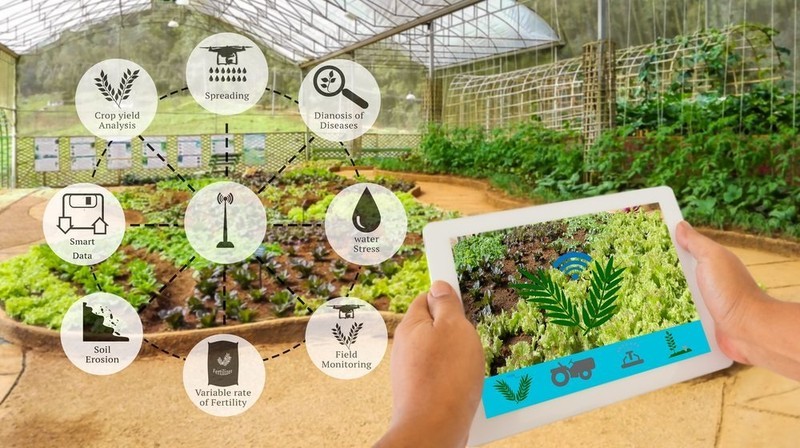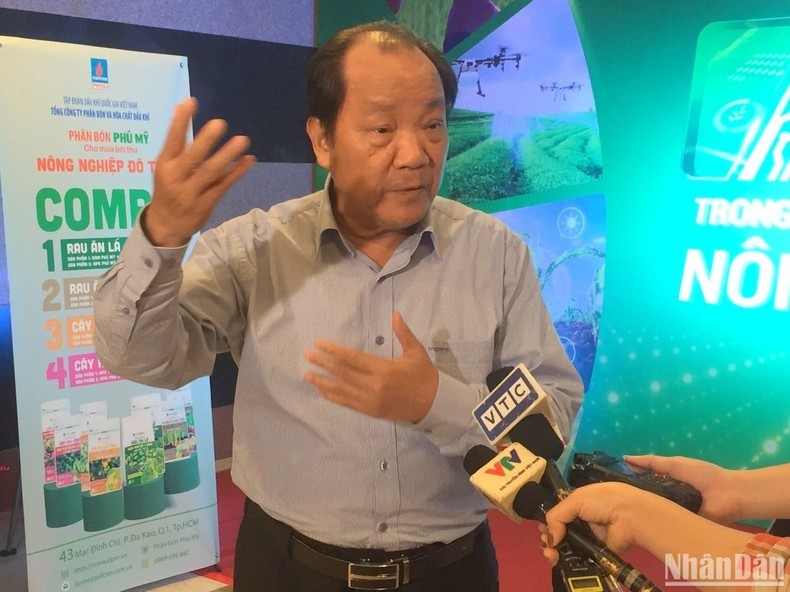
On January 26, 2021, the Prime Minister issued Decision No. 127/QD-TTg, promulgating the "National Strategy on Research, Development and Application of Artificial Intelligence to 2030", including content: “Promoting AI applications in agricultural hi-tech production, to improve intelligence, automate production processes, improve productivity and the quality of agricultural products, ensuring transparent production process, origin, and a clean food supply for consumers.".
AI can help improve crop productivity, and control pests, diseases, and cultivation conditions while promoting the performance of farming-related tasks, across food supply chains. Farmers around the globe are applying AI to minimise the impacts of chemical use on the environment. Advances in the manufacturing of AI-controlled robots are also helping farmers use less land and manpower, while still boosting production.
Talking to the press on the sidelines of the conference on AI application in agriculture, recently hosted by the General Council of Agriculture and Rural Development Vietnam, Dr. Tran Quy, Director of the Vietnam Institute of Digital Economy Development, emphasised that the importance of AI to the development of modern agriculture is undeniable.
Dr. Tran Quy said that the demand and prospect of AI applications in agriculture, in Vietnam, are great because it helps this industry to solve many problems that are currently being raised, related to the process of management, production and consumption of agricultural products.
Specifically, AI application plays an important role in the development of modern and sustainable agriculture, as they will help with farm automation and optimisation, from weather forecasting, and plant and livestock health monitoring, to product quality improvement.
In addition, AI enhances accuracy and speed in the manufacturing process. With the ability to quickly and accurately collect and process data, AI systems can help detect production problems earlier and provide quick solutions.

However, Dr Quy also pointed out the challenge of AI application to agriculture in Vietnam - the high prices for hardware and software of AI systems.
According to the Director of the Vietnam Institute of Digital Economy Development, farmers also need the training to use new technology, while relevant parties, including technology producers, the Government, and agriculture organisations, need to cooperate in developing suitable AI applications, to meet farmers’ conditions and demand in the market.
Echoing the view, Ho Xuan Hung, Chairman of the General Council of Agriculture and Rural Development of Vietnam, also said that it is necessary to promote communication, so that farmers are more aware of the role and importance of digital transformation and the application of technology in agricultural production, thereby gradually forming new thinking.
Another issue, mentioned by the Chairman of the General Council of Agriculture and Rural Development of Vietnam, is that investment in new technology is always risky. In the process of accessing technology, farmers need support and insurance from businesses, he added.
According to Chairman Hung, for businesses to lead and connect with cooperatives and farmers, it is necessary to have support from the State. The State needs to create an environment for companies to be ready to participate through policies, to encourage and protect.
At the same time, it is necessary to affirm the specific and long-term role of farmers and to train farmers to become business owners, farm owners or shareholders of enterprises. All of these factors will help improve access to artificial intelligence technology in Vietnam's agricultural sector.
Noting some bottlenecks in digital transformation in agriculture, Nguyen Quoc Toan, Director of the Centre for Informatics and Statistics at the Ministry of Agriculture and Rural Development, said the awareness of and regulations on digital transformation in agriculture remain limited. Without regulations paving the way, all non-compulsory applications will not be used widely, in reality.
To boost digital transformation in general and AI application to agriculture in particular, he held that it is necessary to raise farmers’ and businesses’ awareness, issue guidance on digital production processes, develop digital infrastructure, enhance cyber security, and build the sector’s database.

 Previous page
Previous page Back to top
Back to top







